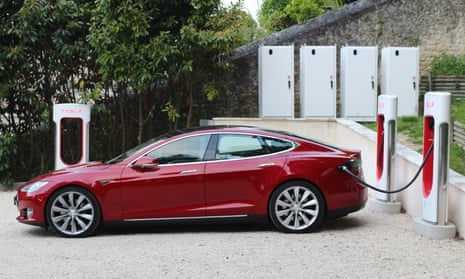A shortage of charging points and strain on energy supplies are now the main stumbling blocks to the rise of driverless electric cars, according to the UK boss of insurer Axa.
Amanda Blanc said a lack of rapid charging bays and pressure on the National Grid have overtaken questions about accident liability as the biggest barriers to autonomous vehicles entering the transport mainstream.
Blanc, a Tesla driver, said personal experience pointed to problems lying ahead for driverless electric vehicles. There are about 125,000 plug-in electric cars in the UK and 14,000 chargers – 2,620 of them being rapid chargers that can give a car an 80% charge in 30 minutes. Shell has recently opened its first charging points for electric vehicles at 10 filling stations, mostly in London and the south-east.
Blanc said a recent long-distance family trip showed the potential limitations of a future dominated by autonomous transport. When Blanc recently drove to Edinburgh in the Tesla with her family, they stopped twice to use a supercharger but went for coffee while the car charged. “In three to four years’ time when more people are buying electric, you do not want to have to queue for your supercharger,” she said. “The infrastructure has to be fixed.”
The other issue for Blanc is the strain on Britain’s electricity supply. According to the National Grid, growth in electric vehicles on Britain’s roads could see peak electricity demand jump by more than the capacity of the Hinkley Point C nuclear power station by 2030.
She explained: “If suddenly everyone’s got one [an electric car] I’m not sure how the National Grid is going to cope with that. If in the Coronation Street break everyone goes to put the kettle on and that causes problems, just imagine what will happen if everybody comes home from work at 6 o’clock and switches their cars on to charge – we have to be smarter about renewables and regenerating electricity. That’s a real challenge.”
Blanc, whose Axa unit has 10 million customers, is one of the strongest backers of self-driving and electric cars in the insurance industry. She believes that children born today will not need to learn to drive and as grown-ups will be cruising around Britain’s cities in electric “robo-cars”. Advocates say they will reduce pollution, be cheaper to run and provide mobility to those unable to drive, including the elderly.
Until recently, the question of who is liable in an accident involving a self-driving car was seen as a major hurdle in the development of autonomous vehicles – but Blanc said a government draft bill had brought clarity.
If it becomes law, insurers will automatically pay out if motorists crash a car in self-driving mode. The question of whether man or machine are to blame will then be debated by the insurance company and the carmaker. If the motorist is found to have been negligent by failing to download safety-critical software updates, for instance, the insurance payout can be reduced.
With 85-90% of road accidents caused by human error, the adoption of self-driving cars is expected to slash the number of small claims made by motorists – and insurance premiums will come down as a result. The industry would be left with more severe claims: when an accident does happen, the cost is likely to be higher because car parts are now bristling with technology and are more expensive to replace.
Some of the world’s biggest carmakers and technology companies including Volvo, Ford, Nissan and Google are vying to develop the first fully automated vehicles. Tesla Autopilot software already allows drivers to take their hands off the wheel in certain circumstances. Blanc said about her Tesla: “Two weekends ago we were driving too close to the kerb and it corrected on my husband’s behalf. It’s starting to think for you.”
The chancellor recently reaffirmed a budget pledge to ensure “genuine driverless vehicles” on Britain’s roads by 2021. Phillip Hammond admitted that it would be a “very challenging” achievement: a million drivers of commercial vehicles would have to retrain.
But others point to progress being made. Waymo, a company that started as part of Google, launched tests of fully driverless taxis on the streets of Phoenix, Arizona, last month. Jaguar Land Rover is testing self-driving vehicles on public roads in Coventry, albeit with a driver in the front seat.
Axa is involved in several self-driving car trials funded by the government, including Venturer in Bristol and UK Autodrive in Milton Keynes.
- Follow Guardian Business on Twitter at @BusinessDesk, or sign up to the daily Business Today email here

Comments (…)
Sign in or create your Guardian account to join the discussion